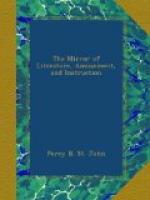he had been educated, rushed on his mind, and, like
furies armed with fiery scourges, seemed determined
to drive him to despair. As he combated these
horrible recollections with distracted feelings, but
with a resolved mind, he became aware that his arguments
were answered by the sophistry of another, and that
the dispute was no longer confined to his own thoughts.
The Author of Evil was present in the room with him
in bodily shape, and, potent with spirits of a melancholy
cast, was impressing upon him the desperation of his
state, and urging suicide as the readiest mode to
put an end to his sinful career. Amid his errors,
the pleasure he had taken in prolonging his journey
unnecessarily, and the attention which he had bestowed
on the beauty of the fair female, when his thoughts
ought to have been dedicated to the religious discourse
of her father, were set before him in the darkest
colours; and he was treated as one who, having sinned
against light, was, therefore, deservedly left a prey
to the Prince of Darkness. As the fated and influential
hour rolled on, the terrors of the hateful Presence
grew more confounding to the mortal senses of the
victim, and the knot of the accursed sophistry became
more inextricable in appearance, at least to the prey
whom its meshes surrounded. He had not power
to explain the assurance of pardon which he continued
to assert, or to name the victorious name in which
he trusted. But his faith did not abandon him,
though he lacked for a time the power of expressing
it. “Say what you will,” was his answer
to the Tempter; “I know there is as much betwixt
the two boards of this Book as can insure me forgiveness
for my transgressions, and safety for my soul.”
As he spoke, the clock, which announced the lapse of
the fatal hour, was heard to strike. The speech
and intellectual powers of the youth were instantly
and fully restored; he burst forth into prayer, and
expressed, in the most glowing terms, his reliance
on the truth, and on the Author, of the gospel.
The demon retired, yelling and discomfited; and the
old man, entering the apartment, with tears congratulated
his guest on his victory in the fated struggle.
The young man was afterwards married to the beautiful
maiden, the first sight of whom had made such an impression
on him, and they were consigned over at the close of
the story to domestic happiness.—So ended
John MacKinlay’s legend.
The author of Waverley had imagined a possibility
of framing an interesting, and perhaps not an unedifying,
tale, out of the incidents of the life of a doomed
individual, whose efforts at good and virtuous conduct
were to be for ever disappointed by the intervention,
as it were, of some malevolent being, and who was
at last to come off victorious from the fearful struggle.
In short, something was meditated upon a plan resembling
the imaginative tale of Sintram and his Companions,
by Mons. Le Baron de la Motte Fouque, although,
if it then existed, the author had not seen it.
The scheme projected may be traced in the first three
or four chapters of the work, but farther consideration
induced the author to lay his purpose aside. In
changing his plan, however, which was done in the
course of printing, the early sheets retained the
vestiges of the original tenor of the story, although
they now hang upon it as an unnecessary and unnatural
encumbrance.




